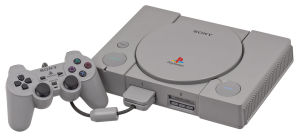Twenty Years of Kicking Butt and Making Games
Posted by Rampant Coyote on December 4, 2014
 The original Sony Playstation is twenty years old now. At least if you count its Japanese release.
The original Sony Playstation is twenty years old now. At least if you count its Japanese release.
I suddenly feel old.
I got my first professional game development job in October 1994. My studio, SingleTrac, was a new startup (I was employee #16!) under contract with Sony to produce a couple of new games for their upcoming console. Back then, when I was allowed to tell people I was making games for the Playstation (after it launched in Japan?), they’d look at me and say, “What’s that?”
When I explained it was a new game console, they’d ask (even if I’d said it was by Sony), “Is that one from Nintendo or Sega?”
Twenty. Frickin’. Years.
I remember riding on the bus to a Microsoft event at GDC (called CGDC back then) a year or so later and hearing a conversation behind me with a guy who had made games for the Atari 2600 back in 1980. I thought, “Wow, that was fifteen years ago! How incredible that he worked on those ancient games!” Now my first games are even more ancient than the Atari games were back then. Well, some of them.
Amusingly, back then I was the “game guy” surrounded by a bunch of people who came from the simulator industry. Now? I’m the guy (well, one of the guys) from the video game world in a simulator company.
Working on the PS1 was a joy. Seriously. It had some excellent tools for the time. The tools were all C / C++ based, which was actually a step up for developers who were used to dealing with 8-bit or 16-bit systems (or so I have been told). It was designed to be 3D, although its 2D capabilities were certainly up to the task. It got away from the cartridge system, which made duplication & distribution a lot simpler, and with the CD-ROM could provide video (often used to terrible effect, including from us…) and play high-quality redbook audio music – a major step up for video game audio.
And at the time, before 3D cards became a thing, it was capable of displaying graphics superior to what was available on the PC at the time.
It’s hard to say looking back how much I’ve changed, and how much the games biz has changed. I mean, the whole indie thing has happened. That’s HUGE. And the consoles are no longer the only game in town. Not only do they still have to contend with the PC, which while no longer in the heyday it was in the early 90s but is still a consistently popular platform, but they’ve got to deal with handhelds, with mobile devices, with web-based gaming, upstart microconsoles, and quite possibly (in the near future) VR systems and wearable computers. I think that represents a healthy, if highly competitive, ecosystem.
Making games remains hard. At least, making good, competitive-quality games is hard. As it has gotten easier to actually do the coding and development of games and better tools have made asset creation easier, there’s been a corresponding increase in competition. Thus, you could argue that the difficulty has stayed almost constant.
Twenty years is a very long time in the tech world, and in video games it is positively ancient. It seems that the details, tools, platforms, technology, and the hot trends may change (a lot) over time, but the fundamentals seem to be the same now as they were 20 years ago… or even 32 years ago, when I first started making hobbyist games as a kid.
Filed Under: Game Development, Geek Life, Retro - Comments: 2 Comments to Read
Alberto said,
I still play PS1 games a lot!
These days most games have little to no replayability…
Maybe they’re fun&all, but when you reach the end of the game, then it’s pretty much game over.
Rampant Coyote said,
I wonder if some of that is by design. I mean, sure, some genres lend themselves to that. But mainstream games have gotten a lot shorter in their duration, and while some of that was in response to the “average” play time a player puts into games, I suspect part of it is so the player will be “done” and ready to buy a new game by the end of the month.